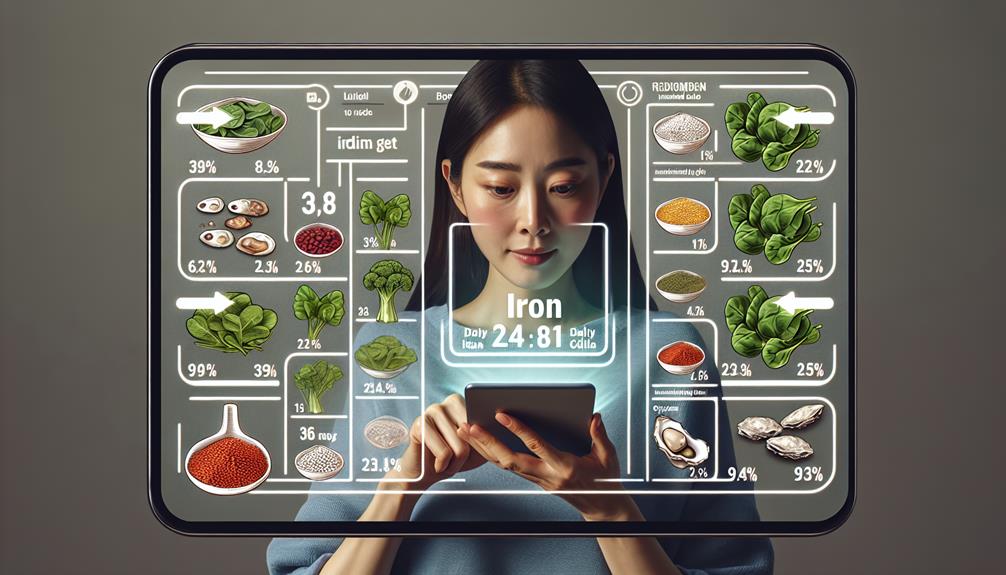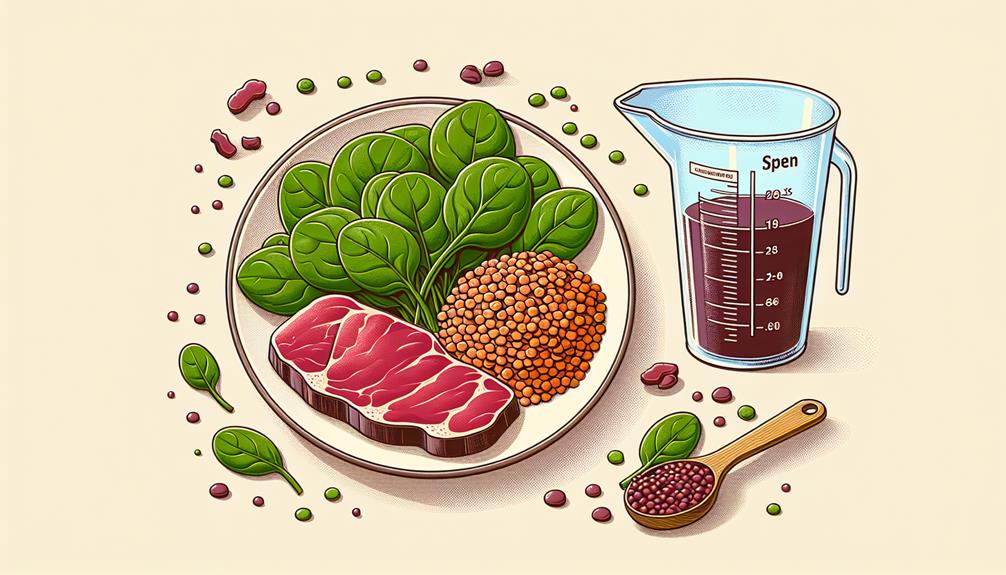Iron Intake Calculator
Ensuring adequate iron intake is essential for overall health and vitality. But, do you truly know if you're meeting your daily iron needs? Perhaps you find yourself wondering how to navigate the complexities of iron requirements and absorption. Fear not, as an Iron Intake Calculator might just be the tool you need to shed light on this matter. By inputting your specific details, you could uncover valuable insights into your iron consumption levels. Stay tuned to discover how this calculator could be your key to a well-rounded diet.
Key Takeaways
- Personalized iron intake recommendations based on age, gender, and activity level.
- Incorporate iron-rich foods and supplements to meet daily nutritional needs.
- Enhance iron absorption with vitamin C sources and cooking methods.
- Regular monitoring of iron levels and adjustments to prevent deficiencies.
Importance of Iron in the Diet
Understanding the significance of including iron in your diet is essential for maintaining overall health and well-being. Iron plays a crucial role in the body, as it is involved in the production of hemoglobin, which carries oxygen to all parts of your body. When your iron levels are low, you may experience fatigue, weakness, and decreased immune function. To ensure you meet your daily iron requirements, consider incorporating iron-rich foods into your meals. Foods such as red meat, poultry, beans, lentils, and leafy green vegetables are excellent sources of iron. Additionally, you may need to consider taking iron supplements if you have an increased need for iron, such as during pregnancy or if you have been diagnosed with iron deficiency anemia. However, it is essential to consult with a healthcare provider before starting any supplements to determine the appropriate dosage for your individual needs. By prioritizing iron intake through a balanced diet and, if necessary, supplements, you can support your overall health and vitality.
Factors Affecting Iron Requirements
To determine the factors influencing your iron requirements, consider various aspects that can impact your body's need for this essential mineral. Iron requirements can vary based on factors such as age, gender, and overall health status. Dietary sources rich in iron play a crucial role in meeting your daily needs. Iron from animal sources, known as heme iron, is more easily absorbed by the body compared to non-heme iron from plant-based sources.
Iron deficiency is a common concern that can affect your iron requirements. Factors such as blood loss, inadequate dietary intake, poor absorption, and increased demand (e.g., during pregnancy) can contribute to iron deficiency. It is essential to consume a balanced diet that includes iron-rich foods like lean meats, poultry, seafood, beans, nuts, and fortified cereals to prevent deficiencies.
Monitoring your iron levels regularly through blood tests can help assess your iron status and determine if adjustments to your diet or supplementation are necessary to meet your body's iron requirements effectively.
How to Use the Iron Intake Calculator

You can access the Iron Intake Calculator on our website to determine your daily iron needs accurately. This tool is user-friendly and requires you to input some basic information like your age, gender, and activity level. Once you have entered these details, the calculator will provide you with a personalized recommendation for your daily iron intake. It's a quick and easy way to ensure you are meeting your nutritional needs.
In addition to using the calculator, it's essential to incorporate iron-rich foods into your diet. Foods such as lean meats, beans, tofu, and fortified cereals are excellent sources of iron. Including recipes that feature these ingredients can help you meet your daily iron requirements deliciously.
If you struggle to get enough iron from your diet alone, consider iron supplements. These can be beneficial, especially for individuals with iron deficiencies or increased iron needs. However, it's essential to consult with a healthcare provider before starting any supplements to ensure they are suitable for you and to avoid any potential side effects.
Tips for Increasing Iron Absorption
For better absorption of iron, consider combining iron-rich foods with sources of vitamin C in your meals. Vitamin C helps enhance the absorption of non-heme iron, which is commonly found in plant-based sources. Including foods like bell peppers, oranges, strawberries, or tomatoes with your iron-rich meals can significantly boost your iron absorption.
Certain cooking techniques can also influence the bioavailability of iron. For example, using cast-iron cookware can increase the iron content of your meals, especially when cooking acidic foods. Additionally, avoiding excessive consumption of tea or coffee during meals can help prevent the inhibition of iron absorption due to compounds like tannins.
If you struggle to meet your daily iron requirements through diet alone, you may consider taking iron supplements after consulting with a healthcare provider. These supplements can help bridge the gap between your dietary intake and recommended daily amounts, ensuring you meet your iron needs for optimal health.
Monitoring Your Iron Intake

Monitoring your iron intake is crucial for maintaining optimal health and preventing potential deficiencies. Here are some practical tips to help you keep track of your iron levels effectively:
- Keep a Food Diary: Documenting your daily iron intake from both food and supplements can help you ensure you are meeting your recommended daily intake.
- Use an Iron Intake Calculator: Utilize online tools or apps that can help you track the amount of iron you consume each day and compare it to the recommended daily values.
- Consult a Healthcare Provider: If you are considering taking iron supplements, it is essential to consult with a healthcare provider to determine the right dosage for your individual needs.
- Focus on Iron-Rich Foods: Incorporate foods such as red meat, beans, lentils, spinach, and fortified cereals into your diet to naturally boost your iron levels.
Frequently Asked Questions
Can Iron Supplements Be Harmful if Taken in Excess?
Excess iron supplements can be harmful. Iron toxicity risks include organ damage and gastrointestinal issues. Factors affecting iron absorption, like vitamin C intake, can impact how much iron your body absorbs. Be cautious with iron supplements.
Are There Any Foods That Can Inhibit Iron Absorption and Should Be Avoided?
Like a skilled chef, you must master the art of avoiding inhibitors to maximize iron absorption. Opt for cooking techniques that enhance bioavailability, such as using cast iron cookware and pairing iron-rich foods with vitamin C sources.
Can Iron Deficiency Be Prevented Through Dietary Changes Alone, or Are Supplements Necessary?
To prevent iron deficiency, focus on dietary modifications first. Incorporate more iron-rich foods for optimal iron absorption. Supplements may be necessary if dietary changes alone don't suffice, but aim for nutritional balance through food whenever possible.
How Does Age or Gender Affect a Person's Iron Requirements?
As you age, your body's iron needs may change. Dietary recommendations vary based on age and gender. Women generally need more iron due to menstrual losses. Consuming iron-rich foods like lean meats, legumes, and fortified cereals can help meet your nutritional needs.
Are There Any Medical Conditions That May Increase the Risk of Iron Deficiency, and How Can They Be Managed?
If you have chronic illnesses, managing iron deficiency is crucial. Pregnancy increases iron needs but also raises the risk of depletion. Regular blood tests and tailored supplements with your doctor's guidance can help maintain optimal iron levels.
Conclusion
So, there you have it! With the help of the iron intake calculator, you can now easily track your daily iron needs and make sure you're meeting your nutritional requirements. Remember, iron is essential for your overall health, so don't skimp on it! And hey, who says calculating your iron intake can't be fun? Stay savvy with your nutrition and keep those iron levels up - your body will thank you!













